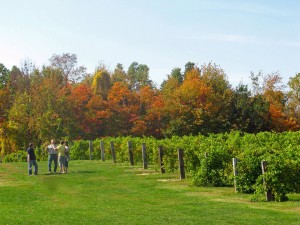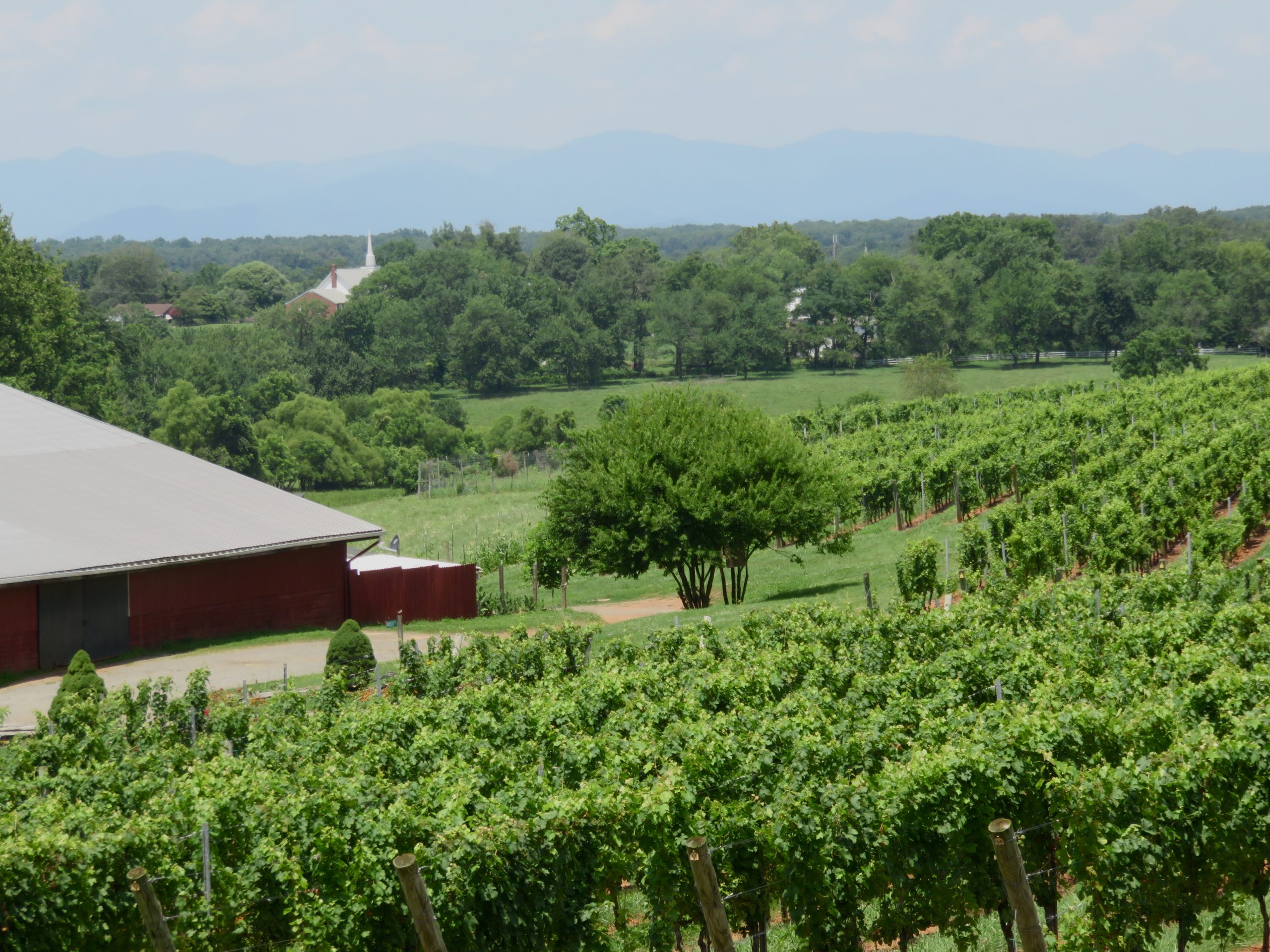Michigan Wine Wire
Tough Choices for Juice Grape Growers
Many labrusca grape growers in Southwest Michigan are taking a long, hard look at their books right now and wondering if they should change their crops for next year or get out of the business entirely. According to the Michigan Department of Agriculture and Rural Development, 85 percent of the “juice grape crop,” worth $17 million, was lost this year.
That’s because warm weather in March caused early budding, which was followed by killer frost in April. (Fortunately for grape growers in the northern part of the state, the frost did not have as severe an impact there.)
 Disaster relief is available in the form of low-interest loans from the feds and the state. Michigan has made $15 million available for the program and the U.S. Department of Agriculture is adjusting some of its existing loan programs for fruit farmers affected by the disaster. (More information on the loans can be found on the USDA’s website.)
Disaster relief is available in the form of low-interest loans from the feds and the state. Michigan has made $15 million available for the program and the U.S. Department of Agriculture is adjusting some of its existing loan programs for fruit farmers affected by the disaster. (More information on the loans can be found on the USDA’s website.)
Terry Holloway of the National Grape Cooperative, a group of growers that supply Welch’s, said it is too early to tell how many will apply for disaster relief. “Many growers picked more than expected, preventing them from collecting an insurance payment and most likely disqualifying them from disaster relief,” Holloway said. “With that said, no one is happy because you’re still below cost of production making it difficult to operate next year.”
To continue reading this post, you must either subscribe or login.[login_form][show_to accesslevel=”annual-membership” ]
He added that some grape growers are opting to grow corn or soybean while others will “have to face the reality” of the effects of adverse weather on their businesses.
So called “juice grapes” like Concord and Niagara are used in wine production throughout the Midwest. Producers can sell juice grapes in the Midwest for $200-$300 a ton which is much less than price wine grapes command. Most grape growers in the Midwest rely extensively on manual labor which adds to production costs. Conversely, row crop production is largely mechanized but requires large capital expenditures.
Tyson Lemon, a financial services officer with Greenstone Farm Credit Services in Berrien Springs, which is administering the loan program, said he has received a “relatively minimal” number of loan applications from Michigan’s grape producers.
How About Them Apples
Back in June, we wrote about Northern Michigan’s burgeoning hard cider industry.
See related story: Northern Michigan Hard Cider Production Expands
Stay tuned, there’s more to tell as this region, again, is setting trends as a foodie’s heaven. Meanwhile, Mike Beck of Uncle John’s Cider Mill in St. Johns tells Michigan Wine Wire that upstart Michigan hard cider is holding its own against more-established regions.
Left Foot Charley, a winery in Traverse City that also produces hard cider, earned a Best of Show honorable mention in the last Great Lakes International Cider & Perry Competition (the world’s second-largest cider contest.) Uncle John’s earned a Highly Commended Award at the latest Royal Bath & West Show in England (the world’s largest competition).
“So an industry that is really only a decade old here is faring well against competition that has been around for generations,” says Beck, who is credited by many in Michigan as having launched the hard cider renaissance in the Great Lakes State.
Pigstock 2012: Seven Local Wines Wash Down ‘Local Proteins’
Seven local chefs, seven local courses, seven local wines. It seems that Pigstock 2012 in Traverse City was a lucky day for everybody — except, perhaps, the pigs. Cherry Capital Foods hosted a sold-out celebration of “local proteins” on Oct. 23 in a region of Michigan increasingly known as a foodie’s heaven.
The event raised $2,650 for a pilot program that sets aside “10 cents a meal” for local foods in school lunches, a project of the Michigan Land Use Institute and the Traverse Bay Area Intermediate School District. J.T. “Chip” Hoagland, of sponsor Cherry Capital Foods, tells the Michigan Wine Wire that the event was a great success.
Featured wines: Black Star Farms Arcturos Pinot Noir Rose, Left Foot Charley Pinot Gris, ’11 Brys Estates Gewurztraminer, Chateau Fontaine Pinot Noir, ’07 Peninsula Cellars Cab Franc Merlot from Hogs Back Vineyard, Shady Lane Franc ‘n’ Franc, and Black Star Farms Sirius Maple Dessert Wine.
Food writer Michael Ruhlman was there, and he wrote of the local wine scene: “Quality takes time, trial and error, thinking, but we’re doing it, and I know of no better model than Traverse City, which serves as a great example of what’s possible, producing extraordinary products from what grows best in the region.” See: http://ruhlman.com/2012/10/michigan-italy-ohio-france/
Good Red Hunting Reported in Leelanau
It’s bow hunting season in Michigan now, but the Leelanau Peninsula Vintners Association did not have a 12-point buck in mind when they urged visitors to come out and “Hunt for the Reds of October.” The event, which took place the weekend of October 26-28, offered visitors at 12 local wineries a chance to target nothing but reds in their sights with free tastings.
Ryan Sterkenburg, owner of Gill’s Pier Winery in Leland, which participated in the event, says that it’s not that reds don’t sell well in Northern Michigan. On the contrary, he says, “they sell exceptionally well” here. The LPVA just happened to start with reds in a theme that fit for the month. “I think the Hunt for Reds went very well. It gave the customer an opportunity to seek out specifics rather than coming in for the entire menu,” Sterkenburg says.
One of Gill’s Pier’s reds, Just Unleashed, has been a consistent best seller over the past few years, he says. The trick with reds, he says, is that they need time to “settle down and mature” for more than 12 months. This extra time is something that is often lost amid demand to get the product on the shelf.
“What we have seen is that growers, owners and wine makers are recognizing what it takes to make an excellent product and becoming more patient in the process. Gill’s Pier’s reds, he says, goes a full 18 months in barrels before bottling, and then another 4-6 months before it’s brought to market.
Cherries & Grapes Opens Online Michigan Store
Northern Michigan is famous for its cherries and grapes, so a couple of Michigan entrepreneurs thought it’d be a great idea to set up an online store to help connect producers of these products connect with customers who can’t make up to these parts. “We make it easy for Michigan wineries and other specialty companies to sell online,” says Michael Mikhjian, CTO of Cherries & Grapes which launched in August. Right now, Chateau de Leelanau in Suttons Bay is the only winery selling product on the site, but “we are currently working to bring several others online,” Mikhjian says. The way this works is that all sales are between the customer and the shop, with Cherries & Grapes handling orders and payment.
[/show_to][password-recovery-link text=’Lost Password? Click here for password recovery.’]
[wp_geo_map]


